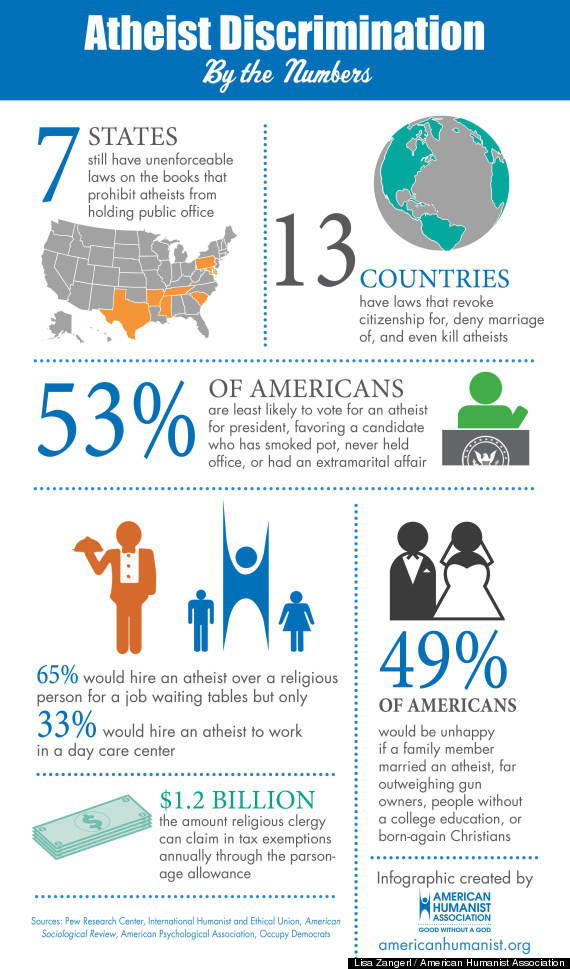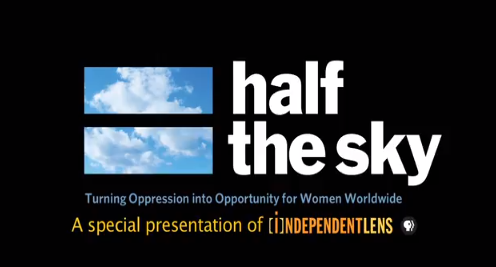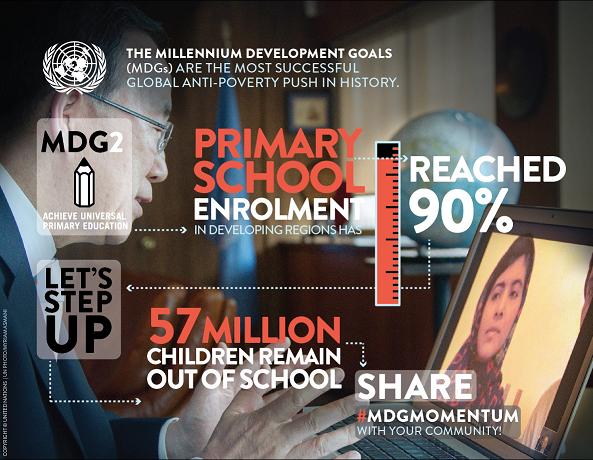Protestant, Catholic, Evangelical, Mormon, Orthodox, Jewish, Buddhist, Muslim, Hindu….Atheist. The majority of American citizens categorize themselves into some form of religious group. We are home to citizens of a variety of religious backgrounds. Yet, one of these things does not look like the others. In a predominantly theist nation, there is a lack of understanding of the American Atheist. Through a sea of misconceptions, Atheists struggle to stay afloat with their moral reputations intact. Inaccurate biases are spread through media and public discourse. These biases affect family views on Atheists, political views, views on trustworthiness, and programs within America that operate at the disadvantage of American Atheists. Persecution of Atheism in America is a problem that can no longer be ignored. In order to inspire a change in dialogue and public opinion, it is important to expose the unfounded bias’ and views of American Atheists. Through creating an awareness of these intolerances, American society can move to become more understanding and open.
What is Atheism? According to the American Atheists, “Atheism is usually defined incorrectly as a belief system. Atheism is not a disbelief in gods or a denial of gods; it is a lack of belief in gods.”[1] Although there is a large debate on whether or not Atheism is a religion, for the purposes of defining which religious beliefs a person subscribes to, it is used as an identifying term. In a country where over 78% of the population identifies with some form of Christianity, the voices of Atheists are often muffled.[2] As a result, religion has an important role in American families.
Imagine a politically divided American family where the mother is mostly conservative, and the father is mostly liberal. While politically divided, they’re bound to agree on some issues. For instance, suppose the daughter in this family comes home for Christmas with her newly announced fiancée. When parents of this girl invite their prospective son-in-law to say grace, he politely declines, stating he is an Atheist. How would they feel about this revelation? According to a poll conducted by Pew Research Center, likely not happy. When asked how they would react to an immediate family member marrying someone who doesn’t believe in God, 58% of mostly conservative respondents stated they would be “unhappy.”[4] Even among respondents who describe themselves as mostly liberal, 41% would be unhappy with this situation.[5] Fast forward a few years, and now it’s their son’s turn to introduce the parents to someone he intends to marry. In contrast to his sister, he brings home a ‘born-again’ Christian. The son is concerned his parents will be unhappy with this partnership, as he saw the opinions that met his sister’s announcement. Fret not. In comparison to the percentage of individuals who would be unhappy with a family member marrying someone who does not believe in God, the odds of his parents unhappiness with a prospective born-again Christian in-law are miniscule. Only 6% of mostly conservative individuals would be unhappy with a family member marrying a born-again Christian, and that percentage only increases by 3% in mostly liberal individuals.[6] These polls demonstrate that Americans are more likely to support a marital union with a born-again Christian than one with an Atheist.
These beliefs about Atheists transfer into politics as well. If two qualified candidates, an Atheist and a Catholic, were to run for president, who is more likely to win? In the court of public opinion, the Catholic will eviscerate the Atheist. In a polling conducted by Gallup, 94% of Americans would be willing to vote for a Catholic candidate, while only 54% would vote for an Atheist.[7] Out of all the categories to choose from, an Atheist candidate was the least likely to be voted for, behind a Muslim candidate.[8] These results belie the common belief that America has a separation church and state, and that all citizens are created free and equal. Clearly, this is not the case. Popular opinion demonstrates that racial biases are more flexible than religious ones. While America currently has an African-American president,it it is highly unlikely that there will be an Atheist president within the next few generations.
Why are the American people against electing an Atheist president? One study suggests that there is not an outright dislike for Atheists, but rather a distrust. A study conducted jointly by the University of British Columbia and the University of Oregon found that distrust is the driving force behind anti-Atheist prejudice.[9] The study also found that individuals who were religious were highly preferred for a job that requires high-trust, such as a daycare worker.[10] When discussing the results, the lead study author stated “People are willing to hire an Atheist for a job that is perceived as low trust, for instance as a waitress. But when hiring for a high-trust job like daycare worker, they were…not going to hire an Atheist for that job.”[11] Part of the same study presented participants with a scenario where a man cheats and steals. When the participants were asked if the thief was more likely to be a Christian, a Muslim, a rapist, or an Atheist, the respondents overwhelmingly selected rapist and Atheist.[12] There was virtually no differentiation between rapists and Atheists.[13] The fact that this kind of stigma is normalized in general public opinion is extremely dangerous. In a world where Atheists already face a discrimination, the proliferation of these beliefs can further ostracize them from society.
There are many aspects of society in which Atheists are overlooked. One of the most tragic cases is the neglect of Atheists serving in the U.S. Military. Military chaplains are one of the key pillars of support for servicemembers. They represent an alternative counseling method widely used by those in service. While there are mental health professionals available to non-theist service members, there are many disadvantages to seeking counseling from mental health professionals rather than military chaplains. For servicemembers, there is a stigmatization with seeking help from a psychiatrist or counselor.[14] This is seen as a sign of weakness, whereas visiting a chaplain is so common that it escapes this stigmatization.[15] Also, the soldier-chaplain relationship guarantees complete confidentiality, whereas seeking help from a mental-health professional does not.[16] Atheists and theists face the same emotional struggles that come from military service, and yet there is a serious lack of support for men and women serving in the military that identify as Atheist or non-theist. While there have been humanist chaplains who have meet all technical eligibilities to become chaplains, they have typically been blocked from becoming chaplains within the military.[17] By simply allowing these humanist chaplains to work beside our servicemembers, the men and women who risk their lives for America would receive the help and counsel that they deserve, regardless of their religious affiliation.
Religion also provides its own breed of social networking and opportunities to create social ties. Children who are brought up “in the church” are provided with friendships and peer relationships earlier than children whose first social interactions with peers begin in preschool. Sunday school can begin as early as birth, and continue throughout high school.[18] This provides children with the beginnings of social networking into young adulthood. Once an adult, churchgoers can create social ties by attending church events along with weekly masses. The United Methodist Church goes as far as to advertise that it “offers singles a variety of ministries where they might discover their future sweethearts.”[19] Atheists do not have a comparable form of social institutionalization. One of the few options for networking among Atheists is attending conferences geared toward Atheism and skepticism, which are usually expensive to attend as they occur infrequently, and can also incur expensive travel costs. By creating a more open dialogue about Atheism around the country, more opportunities for socialization may be established. Atheists cannot establish an easy-access form of connecting and gathering if they fear animosity towards their beliefs from the rest of society.
Celebrities are not exempt from discriminatory beliefs about Atheists. In a bizarre dialogue at the Annual Vera Beach Prayer Breakfast, Phil Robertson, star of popular American television series “Duck Dynasty,” goes into an in-depth fantasization of an atheist family being attacked in their home.[20] His peculiar story follows as: two men break into the home of an atheist man and his family, they tie up and gag the man, rape his “two little atheist daughters” in front of him, shoot the daughters, decapitate his wife, and then as a grandeur final act castrate the man and brandish his “manhood” in front of him.[21] Seemingly, the point of this monologue is that if the man is an Atheist, then there is no moral wrongdoing on the part of the intruders. Robertson states, on behalf of his imaginary intruders, “You’re the one that says there’s no right, there’s no wrong, so we’re just having fun!”[22] It is worth noting that the sound recording of Phil Robertson was provided in support of his spoutings, by website that describes this monologue as a “powerful address.”[23] This shows that these are not the condemned speakings of a zealot, but rather that people support what he is professing. These are dangerous comments, as the “Duck Dynasty” brand has a large following. This is not Phil Robertson’s first time making inflammatory comments. In December of 2013, he was suspended from the reality series by A&E for making outrageous comments to GQ about homosexuality, including comparing it to beastiality.[24][25] Following an outpour of support from Duck Dynasty fans, Robertson’s suspension was lifted a week later.[26] Politicians came to Phil Robertson’s defense in light of his suspension, including the newly announced 2016 presidential candidate Ted Cruz.[27] Discriminatory and hateful comments like these are even more dangerous when made by public figures. Bigots are allowed to publicly promote this hate-speech and not only validate it as part of their religious beliefs, but claim protection under the First Amendment. By allowing such hatred to go unchecked, we are privileging those with religious beliefs at the expense of those without such beliefs. If an Atheist were to tell a similar story of the rape and murder of a Christian family, it would be seen as a vicious, persecutory attack against religious rights. And yet, Robertson’s hateful spiel has received little media attention and condemnation.
When a tragedy occurs, our society tends to search for a simple explanation or meaning behind the horrible act. For example, when three young Muslim students were gunned down in their home in Chapel Hill, North Carolina the media rushed to find what provoked shooter Craig Hicks to commit this act of violence. It was soon discovered through Hicks’ Facebook page, that he was an outspoken Atheist.[28] Despite the condemnation of the attacks by prominent atheists, the media jumped on this tidbit as the explanation as to why he murdered three young students. The Daily Dot stated that his Facebook “reveals an obsessive interest in Atheism.”[29] This is misleading, and spreads the belief that Atheism promotes immorality and evil acts, despite the fact that there is no correlation between Atheism and immorality. In fact, there are countless cases where religion has been used to justify gravely immoral acts. The media makes no effort to understand Atheism, but instead further spreads the bias’ and misunderstandings about American Atheists.
Despite common misconceptions, the American Atheist is not foreign or evil — they are Americans, yearning to be understood. Not all Atheists hate religion or hate religious people, but they do hate being misunderstood and unfairly judged. Widespread discrimination against Atheists is harmful to religious and non-religious Americans alike, because it unfairly ostracizes members of the American public based solely on what they choose to believe, or not believe, about god. These patterns of discrimination are evident in everyday interactions, as well as social and political institutions. In a country where the First Amendment to the Constitution is freedom of religion, America lacks a freedom of non-religion.
References
[1] “What Is Atheism?” American Atheists. 2015. Accessed March 27, 2015.
[2] “Summary of Key Findings (Statistics on Religion in America Report).” Pew Research. 2008. Accessed March 27, 2015. http://religions.pewforum.org/reports.
[3] “Summary of Key Findings (Statistics on Religion in America Report).” Pew Research. 2008. Accessed March 27, 2015. http://religions.pewforum.org/reports.
[4] “Section 3: Political Polarization and Personal Life.” Pew Research Center for the People and the Press RSS. June 11, 2014. Accessed March 27, 2015. http://www.people-press.org/2014/06/12/section-3-political-polarization-and-personal-life/.
[5] “Section 3: Political Polarization and Personal Life.” Pew Research Center for the People and the Press RSS. June 11, 2014. Accessed March 27, 2015. http://www.people-press.org/2014/06/12/section-3-political-polarization-and-personal-life/.
[6] “Section 3: Political Polarization and Personal Life.” Pew Research Center for the People and the Press RSS. June 11, 2014. Accessed March 27, 2015. http://www.people-press.org/2014/06/12/section-3-political-polarization-and-personal-life/.
[7] Jones, Jeffrey. “Atheists, Muslims See Most Bias as Presidential Candidates.” Gallup. June 21, 2012. Accessed March 27, 2015.
[8] Jones, Jeffrey. “Atheists, Muslims See Most Bias as Presidential Candidates.” Gallup. June 21, 2012. Accessed March 27, 2015.
[9] Gervais, Will M., Azim F. Shariff, and Ara Norenzayan. “Do You Believe in Atheists? Distrust Is Central to Anti-atheist Prejudice.” Journal of Personality and Social Psychology 101, no. 6 (2011): 1189-206.
[10] Gervais, Will M., Azim F. Shariff, and Ara Norenzayan. “Do You Believe in Atheists? Distrust Is Central to Anti-atheist Prejudice.” Journal of Personality and Social Psychology 101, no. 6 (2011): 1189-206.
[11] North, Anna. “People Think Atheists Are Just As Bad As Rapists? Christ.” Jezebel. December 1, 2011. Accessed March 30, 2015.
[12] Gervais, Will M., Azim F. Shariff, and Ara Norenzayan. “Do You Believe in Atheists? Distrust Is Central to Anti-atheist Prejudice.” Journal of Personality and Social Psychology 101, no. 6 (2011): 1189-206.
[13] Gervais, Will M., Azim F. Shariff, and Ara Norenzayan. “Do You Believe in Atheists? Distrust Is Central to Anti-atheist Prejudice.” Journal of Personality and Social Psychology 101, no. 6 (2011): 1189-206.
[14] “Military Chaplains Providing Support for Nontheist and Non-Religious Members of the Military.” Secular Coalition for America. Accessed March 30, 2015. http://secular.org/files/secular_coalition_for_america_military_chaplains_issue_statement.pdf.
[15] “Military Chaplains Providing Support for Nontheist and Non-Religious Members of the Military.” Secular Coalition for America. Accessed March 30, 2015. http://secular.org/files/secular_coalition_for_america_military_chaplains_issue_statement.pdf.
[16] “Military Chaplains Providing Support for Nontheist and Non-Religious Members of the Military.” Secular Coalition for America. Accessed March 30, 2015. http://secular.org/files/secular_coalition_for_america_military_chaplains_issue_statement.pdf.
[17] “Military Chaplains Providing Support for Nontheist and Non-Religious Members of the Military.” Secular Coalition for America. Accessed March 30, 2015. http://secular.org/files/secular_coalition_for_america_military_chaplains_issue_statement.pdf.
[18] “Children’s Sunday School.” Cowan First Baptist Church. 2015. Accessed March 31, 2015. http://www.cowanfirstbaptist.org/ChildrensSundaySchool.
[19] Hahn, Heather. “Cupid in The United Methodist Church.” The United Methodist Church. February 13, 2014. Accessed March 31, 2015.
[20] “Friday March 20, 2015 – Phil Robertson.” Trunews. March 20, 2015. Accessed March 27, 2015. http://www.trunews.com/friday-march-20-2015-phil-robertson/.
[21] “Friday March 20, 2015 – Phil Robertson.” Trunews. March 20, 2015. Accessed March 27, 2015. http://www.trunews.com/friday-march-20-2015-phil-robertson/./
[22] “Friday March 20, 2015 – Phil Robertson.” Trunews. March 20, 2015. Accessed March 27, 2015. http://www.trunews.com/friday-march-20-2015-phil-robertson/.
[23] “Friday March 20, 2015 – Phil Robertson.” Trunews. March 20, 2015. Accessed March 27, 2015. http://www.trunews.com/friday-march-20-2015-phil-robertson/.
[24] Merrigan, Tara. “Readers React to GQ’s ‘Duck Dynasty’ Story and Phil Robertson’s Indefinite Suspension.” GQ. December 19, 2013. Accessed March 27, 2015.
[25] Merrigan, Tara. “Readers React to GQ’s ‘Duck Dynasty’ Story and Phil Robertson’s Indefinite Suspension.” GQ. December 19, 2013. Accessed March 27, 2015.
[26] Yahr, Emily. “A&E Retracts Its Suspension of ‘Duck Dynasty’ Star Phil Robertson.” Washington Post. December 17, 2013. Accessed March 27, 2015.
[27] Yahr, Emily. “A&E Retracts Its Suspension of ‘Duck Dynasty’ Star Phil Robertson.” Washington Post. December 17, 2013. Accessed March 27, 2015.
[28] Baker-Whitelaw, Gavia. “Chapel Hill Shooter’s Apparent Facebook Page Showed His Extreme Anti-religious Attitudes.” The Daily Dot. February 11, 2015. Accessed March 31, 2015.
[29] Baker-Whitelaw, Gavia. “Chapel Hill Shooter’s Apparent Facebook Page Showed His Extreme Anti-religious Attitudes.” The Daily Dot. February 11, 2015. Accessed March 31, 2015; and Richard Dawkins, Twitter post, February 11, 2015, 4:15am, twitter.com/RichardDawkins



